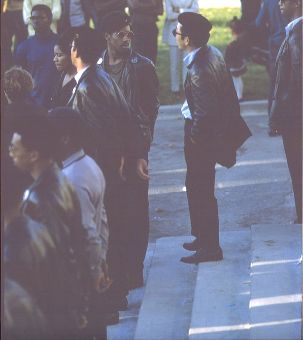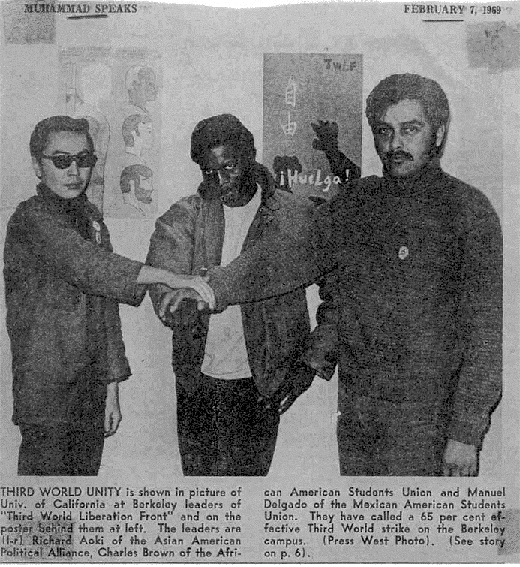Important American History (Black Panthers)
- Thread starter 2-0-Sixx
- Start date
I just stumbled across this site that I thought I share to anyone interested.
http://www.etext.org/Politics/MIM/bpp/index.html
It's a site full of actual articles from The Black Panther newspaper from 1967 - 1970. GREAT articles from the original Panther members.

http://www.etext.org/Politics/MIM/bpp/index.html
It's a site full of actual articles from The Black Panther newspaper from 1967 - 1970. GREAT articles from the original Panther members.

I stumbled across this today about Asian members in the black panther party and I'd thought I'd share...

Mike Tagawa is one of three Japanese Americans to have joined the Black Panther Party. Like Richard Aoki, the national Black Panther Party co-founder, Tagawa was born in an internment camp (Minidoka, 1944). After the war, Tagawa’s family lived in public housing projects in Renton Highlands and Seattle’s Rainier Valley neighborhood before moving to Seattle’s Central District. After graduating from Garfield High School, he joined the U.S. Air Force, eventually serving as a medic in the Travis Air Force Base Psych Ward. While stationed at Travis in 1965 and 1966, Tagawa regularly visited U.C. Berkeley and joined the anti-war movement. He returned to Seattle in 1966, stayed active in the anti-war movement, and, with the encouragement of an old classmate and BPP Minister, Bobby White, joined the Seattle chapter of the Black Panther Party in 1968. Tagawa did not hold a leadership position in the Party, but his interview provides revealing descriptions of the life of a “rank and file” Seattle Panther. After leaving the Black Panthers in 1970, Tagawa co-founded, along with his future brother-in-law Alan Sugiyama, Seattle Central Community College’s Oriental Student Union.
http://depts.washington.edu/civilr/tagawa.htm

Another shade of Black Panther...
By Richard Aoki (Field Marshall)
Growing up was know easy job for Richard at the early stages in his life he and his family were placed in an Internment camp during World War II, a childhood prisoner held at Topaz Concenation camp in Utah from 1942-1945. He joined the military at a young age, Having left the Army after two years of service, Richard was intimately aware of the vicious treatment and punishment that the U.S. government could meter out.
Being Japanese-American and growing up in Black West Oakland, he was tight with Huey P. Newton, Bobby Seale, as well as David Hilliard years before the party started. He also attended Merritt College for two years before transferring to U.C. Berkeley in 1966. Richard remembers" we had discussed pressing political, social issues of the day, that we wanted to do something about it, so we got together one night and hammed out the 10 point program of the Black Panther Party.
full article

Mike Tagawa is one of three Japanese Americans to have joined the Black Panther Party. Like Richard Aoki, the national Black Panther Party co-founder, Tagawa was born in an internment camp (Minidoka, 1944). After the war, Tagawa’s family lived in public housing projects in Renton Highlands and Seattle’s Rainier Valley neighborhood before moving to Seattle’s Central District. After graduating from Garfield High School, he joined the U.S. Air Force, eventually serving as a medic in the Travis Air Force Base Psych Ward. While stationed at Travis in 1965 and 1966, Tagawa regularly visited U.C. Berkeley and joined the anti-war movement. He returned to Seattle in 1966, stayed active in the anti-war movement, and, with the encouragement of an old classmate and BPP Minister, Bobby White, joined the Seattle chapter of the Black Panther Party in 1968. Tagawa did not hold a leadership position in the Party, but his interview provides revealing descriptions of the life of a “rank and file” Seattle Panther. After leaving the Black Panthers in 1970, Tagawa co-founded, along with his future brother-in-law Alan Sugiyama, Seattle Central Community College’s Oriental Student Union.
http://depts.washington.edu/civilr/tagawa.htm

Another shade of Black Panther...
By Richard Aoki (Field Marshall)
Growing up was know easy job for Richard at the early stages in his life he and his family were placed in an Internment camp during World War II, a childhood prisoner held at Topaz Concenation camp in Utah from 1942-1945. He joined the military at a young age, Having left the Army after two years of service, Richard was intimately aware of the vicious treatment and punishment that the U.S. government could meter out.
Being Japanese-American and growing up in Black West Oakland, he was tight with Huey P. Newton, Bobby Seale, as well as David Hilliard years before the party started. He also attended Merritt College for two years before transferring to U.C. Berkeley in 1966. Richard remembers" we had discussed pressing political, social issues of the day, that we wanted to do something about it, so we got together one night and hammed out the 10 point program of the Black Panther Party.
full article
NO , THEY ARE NOT CULTURAL NATIONALIST , THEY ARE MARXIST
AGAIN
AGAIN
HEY CANTE
• In 1862, during the Civil War, at the same time French colonialists had invaded Mexico seeking to take over. However, at the battle of Puebla on May 5, the Mexican defenders, with the help of freed African slaves—this army was considered the complete underdog—defeated and turned back the French invasion. It was a great victory, now celebrated as Cinco de Mayo. This victory was also a blow to the slaveholders of the United States.
• In 1862, during the Civil War, at the same time French colonialists had invaded Mexico seeking to take over. However, at the battle of Puebla on May 5, the Mexican defenders, with the help of freed African slaves—this army was considered the complete underdog—defeated and turned back the French invasion. It was a great victory, now celebrated as Cinco de Mayo. This victory was also a blow to the slaveholders of the United States.
Basically i was talking about the new generation of black panthers.
Do you know you if the OG black panthers were afrocentrists?
If they are Marxist does that mean that they Internationalists?
Are you an internationalist 2Osixx?
What do you think of trotkysm?
If they are cultural nationalist (like me) but use marxist tools they re more like neo marxist (like me)
it maens to me that they are using the the class struggle concept to understand and jugde our world but forget the INTERNATIONALISM.
Do you know you if the OG black panthers were afrocentrists?
If they are Marxist does that mean that they Internationalists?
Are you an internationalist 2Osixx?
What do you think of trotkysm?
If they are cultural nationalist (like me) but use marxist tools they re more like neo marxist (like me)
it maens to me that they are using the the class struggle concept to understand and jugde our world but forget the INTERNATIONALISM.
Basically i was talking about the new generation of black panthers.
Do you know you if the OG black panthers were afrocentrists?
If they are Marxist does that mean that they Internationalists?
Are you an internationalist 2Osixx?
What do you think of trotkysm?
If they are cultural nationalist (like me) but use marxist tools they re more like neo marxist (like me)
it maens to me that they are using the the class struggle concept to understand and jugde our world but forget the INTERNATIONALISM.
Do you know you if the OG black panthers were afrocentrists?
If they are Marxist does that mean that they Internationalists?
Are you an internationalist 2Osixx?
What do you think of trotkysm?
If they are cultural nationalist (like me) but use marxist tools they re more like neo marxist (like me)
it maens to me that they are using the the class struggle concept to understand and jugde our world but forget the INTERNATIONALISM.
you can't be a real revolutionary and not be an internationalist
Thats totally wrong, my motto could be Nationalists of all countries UNITE!
If you want to tackle liberalism and capitalism you can t be internationalists because the banksters, the elite are apatride and are internationalists. Social dumping is only possible because of internationalism.
The system of TOTAL deregulation is based on 3 pillars (see the European constitution for example):
free circulation of goods, humans and capital so the neo capitalist you want to fight are INTERNATIONALISTS.
The free circulation ie no boundaries has for consequences: social dumping.
do you know that Robert Kagan, william krystol or Paul Wolfowitz (just to name a few) are exTrotskyts and internationalists??

